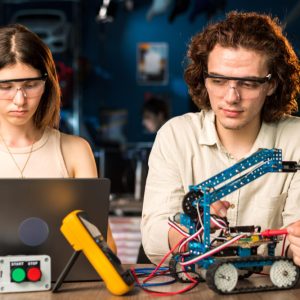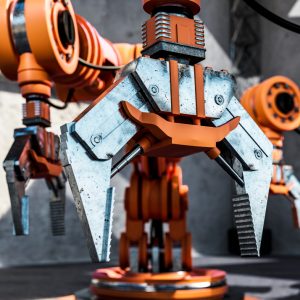Robotics is a rapidly growing field that encompasses a wide range of industries and applications. From manufacturing and healthcare to space exploration and entertainment, the use of robots continues to expand, creating numerous career opportunities for individuals with expertise in robotics. Let’s delve into some of the exciting careers that utilize robotics technology.
Manufacturing and Automation
One of the most common sectors where robotics plays a significant role is manufacturing and automation. Industrial robots are employed in factories and production lines to perform tasks such as assembly, welding, painting, and material handling. Careers in this field include robotics engineers, automation technicians, and manufacturing specialists who design, program, and maintain robotic systems to improve efficiency and productivity in manufacturing processes.
Healthcare and Medical Robotics
The healthcare industry has seen remarkable advancements in medical robotics, offering innovative solutions for diagnostics, surgery, rehabilitation, and patient care. Robotic surgical systems enable precise and minimally invasive procedures, while assistive robots assist individuals with disabilities or mobility impairments. Careers in medical robotics include biomedical engineers, robotic surgeons, and healthcare technology specialists who develop and implement robotic solutions to improve patient outcomes and healthcare delivery.
Aerospace and Space Exploration
Aerospace and space exploration represent another area where robotics plays a crucial role. Robots are used in space missions for tasks such as satellite deployment, planetary exploration, and maintenance of space stations. Careers in aerospace robotics include aerospace engineers, robotics researchers, and space systems engineers who design and operate robotic systems for space exploration and satellite missions, pushing the boundaries of human knowledge and exploration.
Agriculture and Agribotics
The agricultural industry is increasingly adopting robotics technology to enhance efficiency, productivity, and sustainability. Agricultural robots, or agribots, are used for tasks such as planting, harvesting, spraying pesticides, and monitoring crop health. Careers in agribotics include agricultural engineers, precision agriculture specialists, and robotic system designers who develop and deploy robotic solutions to address challenges in modern agriculture, such as labor shortages and environmental concerns.
Logistics and Warehouse Automation
Logistics and warehouse operations rely heavily on robotics technology to streamline processes and optimize supply chain management. Automated guided vehicles (AGVs), robotic arms, and sorting systems are used in warehouses and distribution centers for tasks such as inventory management, order fulfillment, and shipping. Careers in logistics and warehouse automation include robotics technicians, supply chain analysts, and warehouse automation engineers who implement and maintain robotic systems to improve efficiency and reduce costs in logistics operations.
Defense and Security Robotics
Robotics technology plays a vital role in defense and security applications, where robots are used for reconnaissance, surveillance, bomb disposal, and search and rescue missions. Unmanned aerial vehicles (UAVs), unmanned ground vehicles (UGVs), and autonomous underwater vehicles (AUVs) are deployed in military and law enforcement operations to enhance situational awareness and protect personnel. Careers in defense robotics include defense contractors, robotics software engineers, and military robotics specialists who develop and deploy robotic systems for defense and security purposes.
Entertainment and Service Robotics
In the entertainment industry, robotics technology is used to create immersive experiences and interactive attractions. Entertainment robots, such as animatronics and humanoid robots, entertain audiences in theme parks, museums, and theaters. Service robots, such as social robots and companion robots, provide assistance and companionship to individuals in healthcare facilities, eldercare centers, and homes. Careers in entertainment and service robotics include animatronics engineers, robotics designers, and human-robot interaction specialists who create and deploy robotic solutions for entertainment and service applications.
Embracing the Future of Robotics Careers
In conclusion, robotics offers a multitude of career opportunities across various industries, from manufacturing and healthcare to aerospace and entertainment. As technology continues to advance, the demand for skilled professionals in robotics engineering, automation, and artificial intelligence will only continue to grow. Whether you’re interested in designing robotic systems, programming autonomous vehicles, or developing innovative applications, a career in robotics offers the chance to be at the forefront of innovation and make a meaningful impact on society. If you’re passionate about technology, problem-solving, and pushing the boundaries of what robots can do, then a career in robotics may be the perfect fit for you.





